Comparing Two 1TB NVMe Drives with Same NAND, Same Controller: XPG SX8200 Pro vs HP EX950
by Billy Tallis on February 6, 2019 11:30 AM ESTRandom Read Performance
Our first test of random read performance uses very short bursts of operations issued one at a time with no queuing. The drives are given enough idle time between bursts to yield an overall duty cycle of 20%, so thermal throttling is impossible. Each burst consists of a total of 32MB of 4kB random reads, from a 16GB span of the disk. The total data read is 1GB.
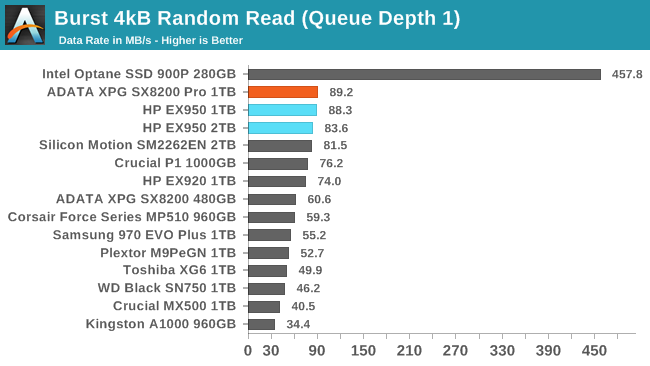
The combination of Silicon Motion NVMe controllers and IMFT 64L 3D NAND continues to provide the best QD1 random read performance available from mainstream SSDs. The retail SM2262EN drives are slightly faster than the engineering sample we tested last year, which itself was an improvement. The top spot among the flash-based SSDs we have tested now belongs to the ADATA SX8200 Pro. The 1TB HP EX950 is slightly faster than the 2TB model.
Our sustained random read performance is similar to the random read test from our 2015 test suite: queue depths from 1 to 32 are tested, and the average performance and power efficiency across QD1, QD2 and QD4 are reported as the primary scores. Each queue depth is tested for one minute or 32GB of data transferred, whichever is shorter. After each queue depth is tested, the drive is given up to one minute to cool off so that the higher queue depths are unlikely to be affected by accumulated heat build-up. The individual read operations are again 4kB, and cover a 64GB span of the drive.
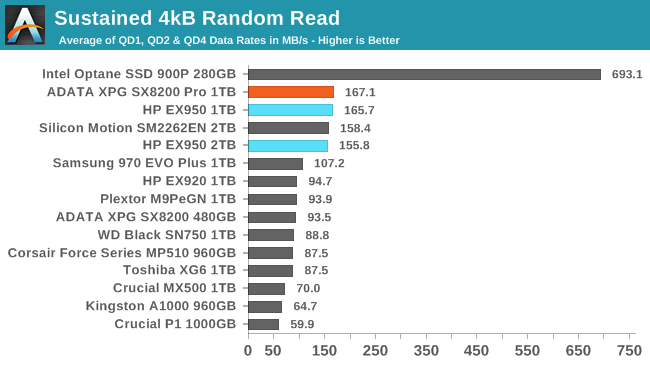
On the longer random read test that brings in some higher queue depths, the SM2262EN drives have a clear and substantial lead over the rest of the flash-based SSDs, including the SM2262-based EX920 and SX8200.
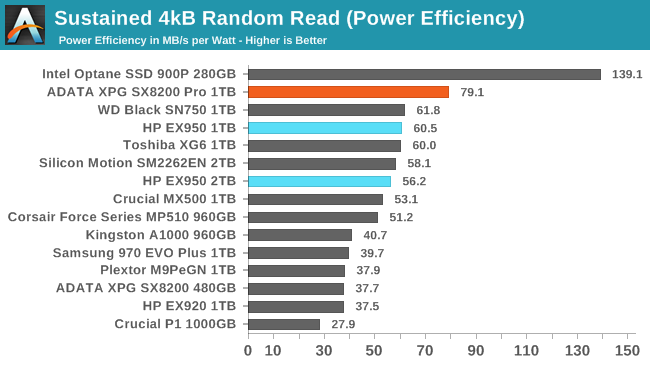 |
|||||||||
| Power Efficiency in MB/s/W | Average Power in W | ||||||||
The ADATA SX8200 Pro takes a clear lead in the efficiency rankings for the random read test, while the EX950 is tied with the WD Black SN750 and Toshiba XG6. The SX8200 Pro averages about 0.6 W lower power draw during this test than the EX950, which is the most power-hungry flash SSD in this bunch.
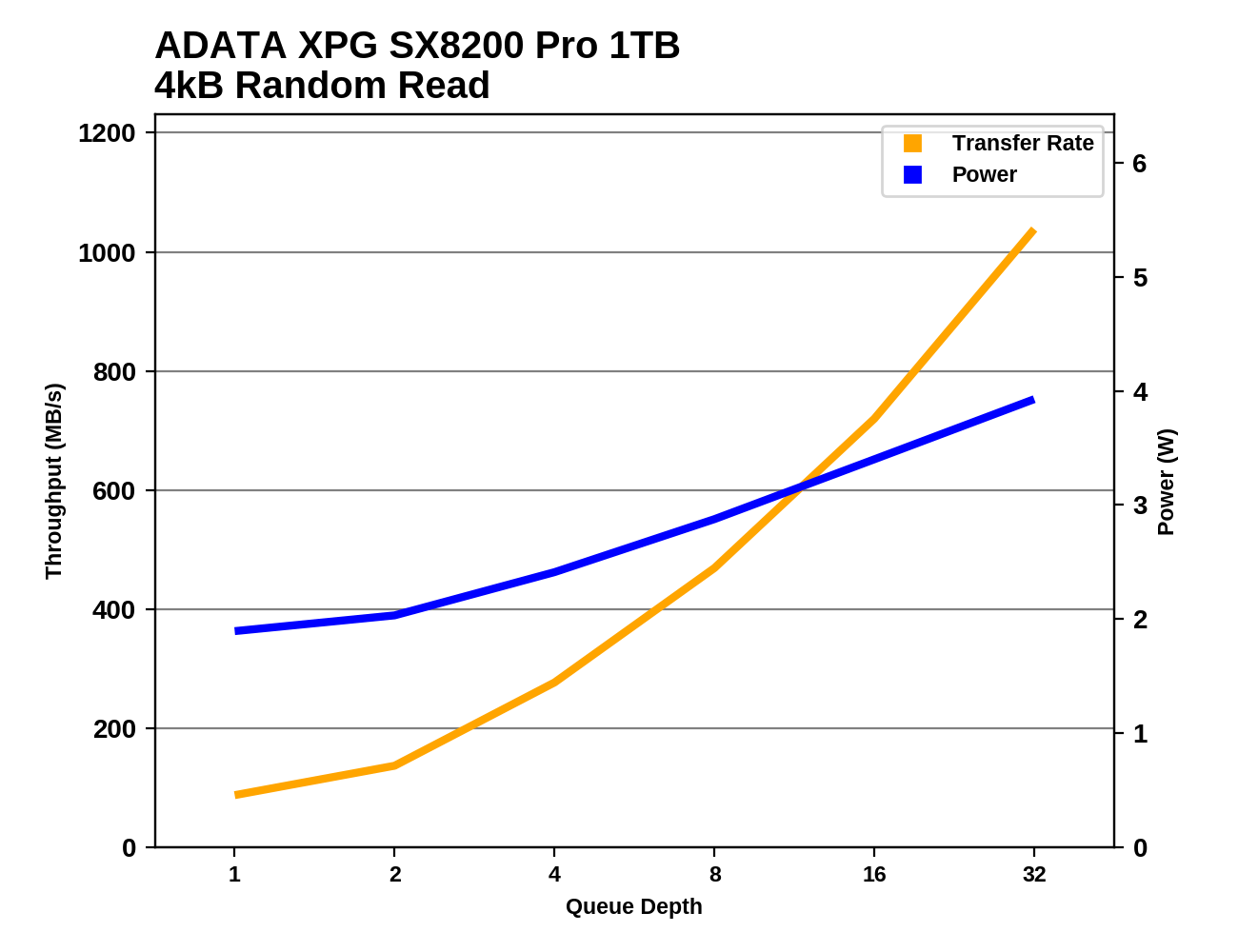 |
|||||||||
The 1TB SX8200 Pro and EX950 perform identically at each queue depth, but the SX8200 Pro has a persistent power draw advantage. The 2TB EX950 draws slightly more power and delivers slightly less performance across the entire tested range of queue depths. Compared to the rest of their competition, the SM2262EN drives maintain a lead in random read performance at every queue depth, and are very close to catching up with the Optane SSD by QD32.
The ADATA SX8200 Pro may be quite efficient for low queue depth random reads compared to other NVMe SSDs, but when graphed against our entire database of results, it is clear that plenty of SATA SSDs deliver better performance per Watt at low speeds, and at higher speeds and queue depths there are some NVMe SSDs that offer similar performance with lower power consumption.
Random Write Performance
Our test of random write burst performance is structured similarly to the random read burst test, but each burst is only 4MB and the total test length is 128MB. The 4kB random write operations are distributed over a 16GB span of the drive, and the operations are issued one at a time with no queuing.
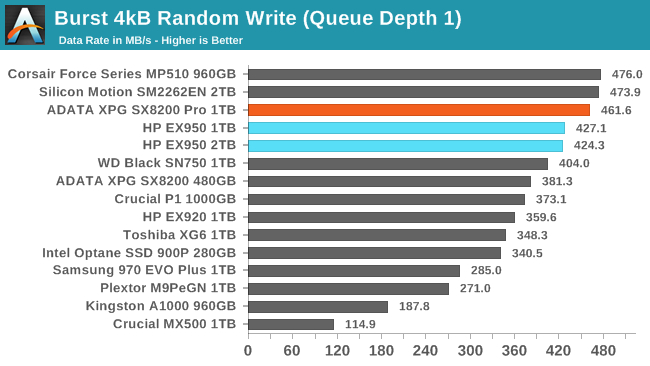
The burst random write performance of the retail SM2262EN drives is a bit lower than we got from the engineering sample we tested last year. The Phison E12-based Corsair Force MP510 is a few percent faster than the ADATA SX8200 Pro, and the HP EX950 is a bit slower but still faster than most other brands.
As with the sustained random read test, our sustained 4kB random write test runs for up to one minute or 32GB per queue depth, covering a 64GB span of the drive and giving the drive up to 1 minute of idle time between queue depths to allow for write caches to be flushed and for the drive to cool down.
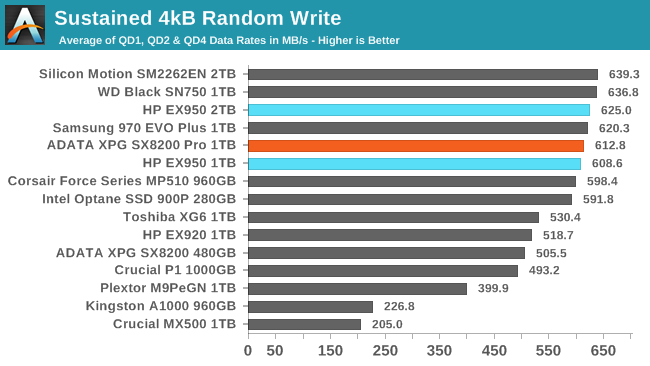
On the longer random write test that includes some higher queue depths, the SM2262EN drives stay near the top of the chart as the Corsair MP510 falls slightly behind and the WD Black SN750 and Samsung 970 EVO Plus catch up—but the overall spread among this top tier of drives is quite small. The 2TB HP EX950 is faster than the 1TB model but doesn't match the performance we got from the 2TB engineering sample.
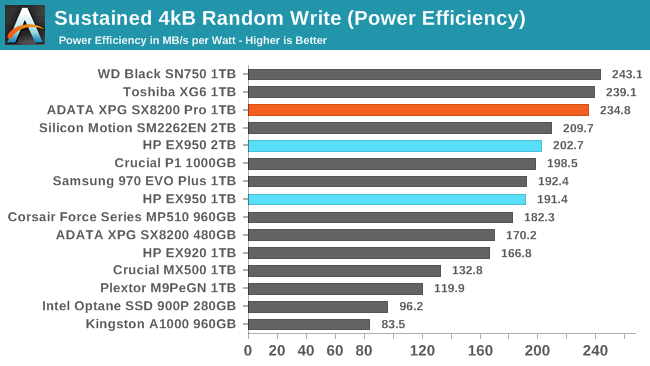 |
|||||||||
| Power Efficiency in MB/s/W | Average Power in W | ||||||||
The power efficiency of the ADATA SX8200 Pro on the random write test is very close to the Toshiba XG6 and WD Black SN750, and those three drives are clearly more efficient than the rest of this bunch, including the HP EX950.
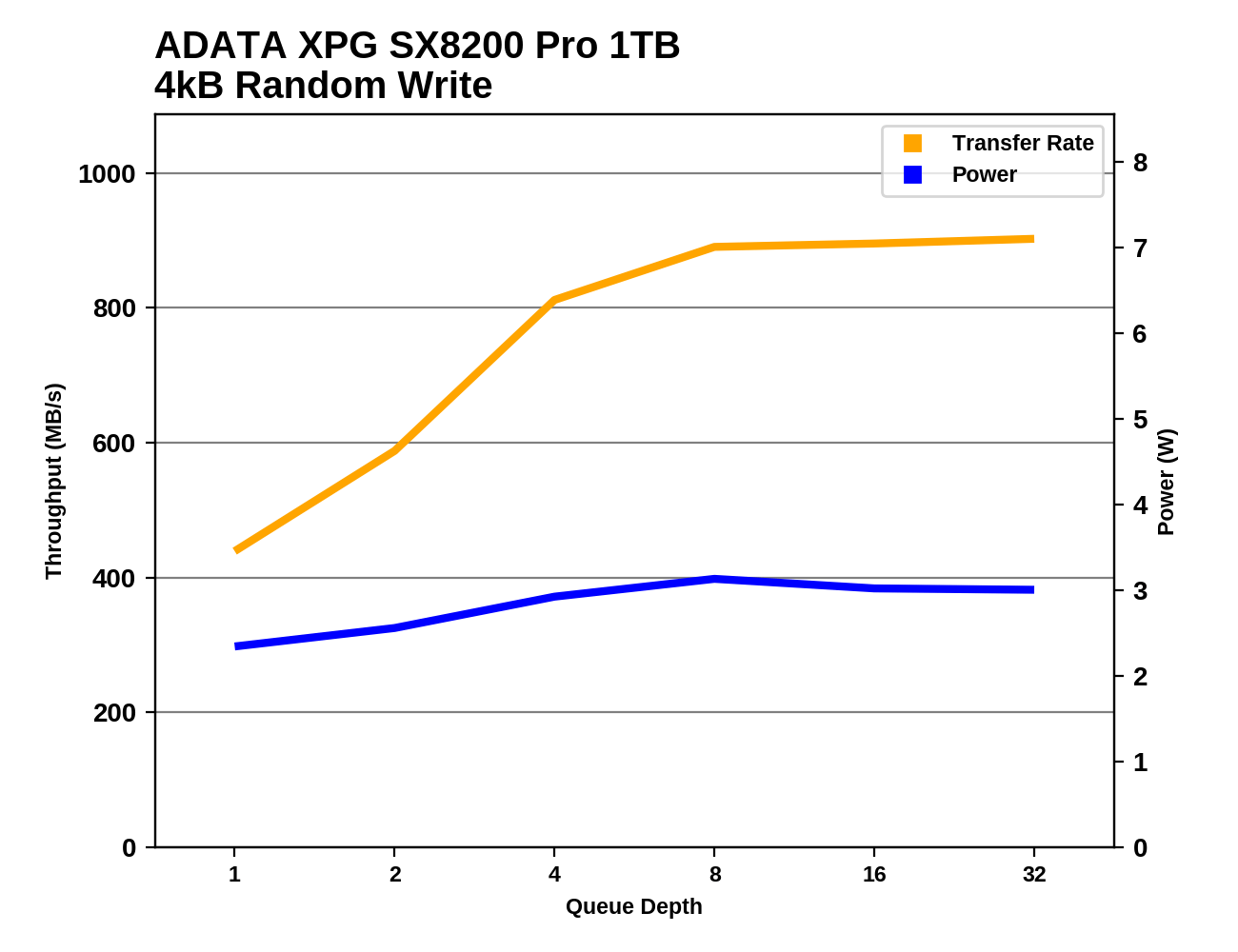 |
|||||||||
The WD Black SN750 and Samsung 970 EVO both start out a bit slower than the SM2262EN drives at QD1, but they reach full performance at QD4 while the SMI drives take a bit longer to saturate and aren't quite as fast at high queue depths.
The ADATA SX8200 Pro may not be able to quite match the fastest TLC drives for random write throughput, but across the entire range of tested queue depths it provides excellent power efficiency that few drives can match.


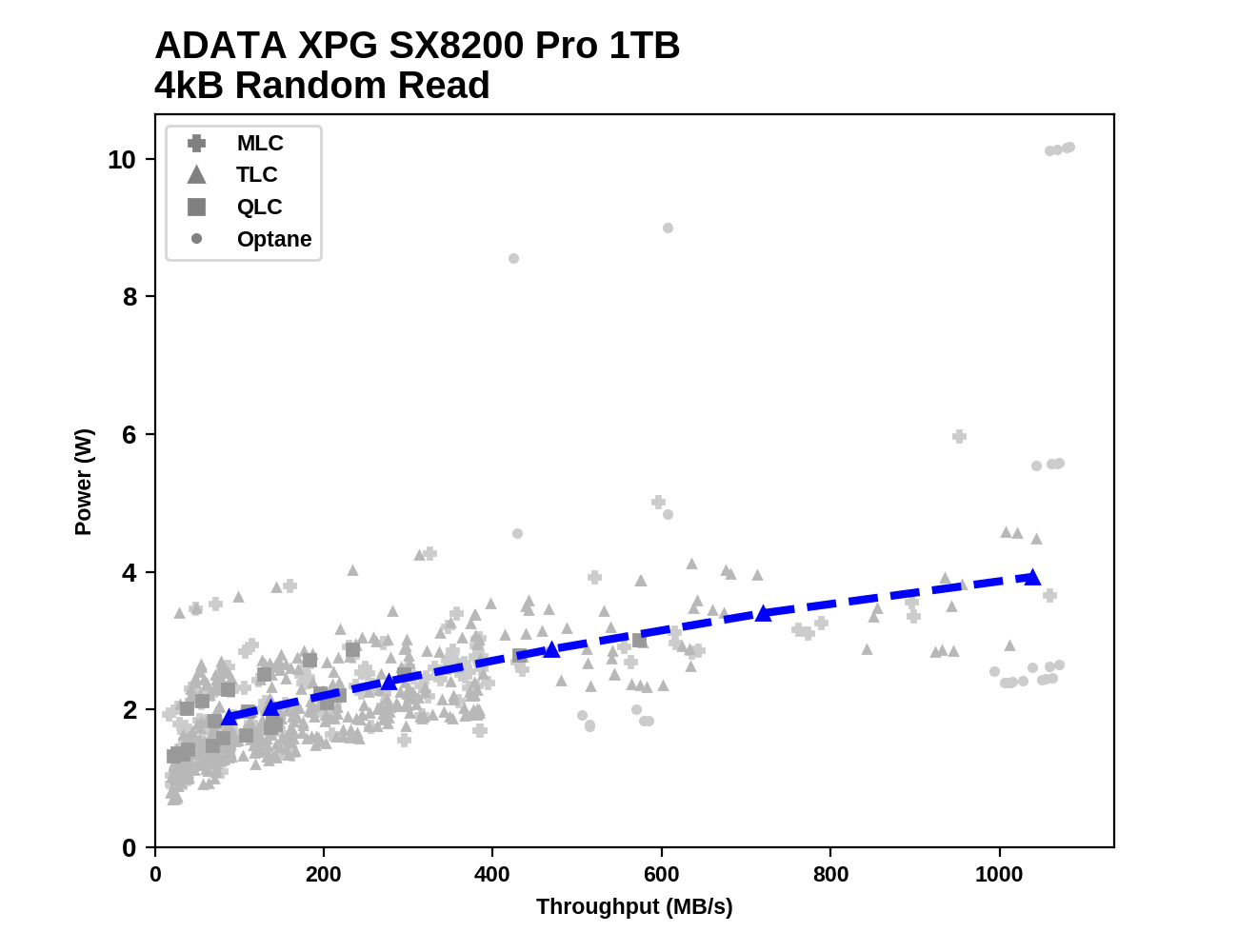
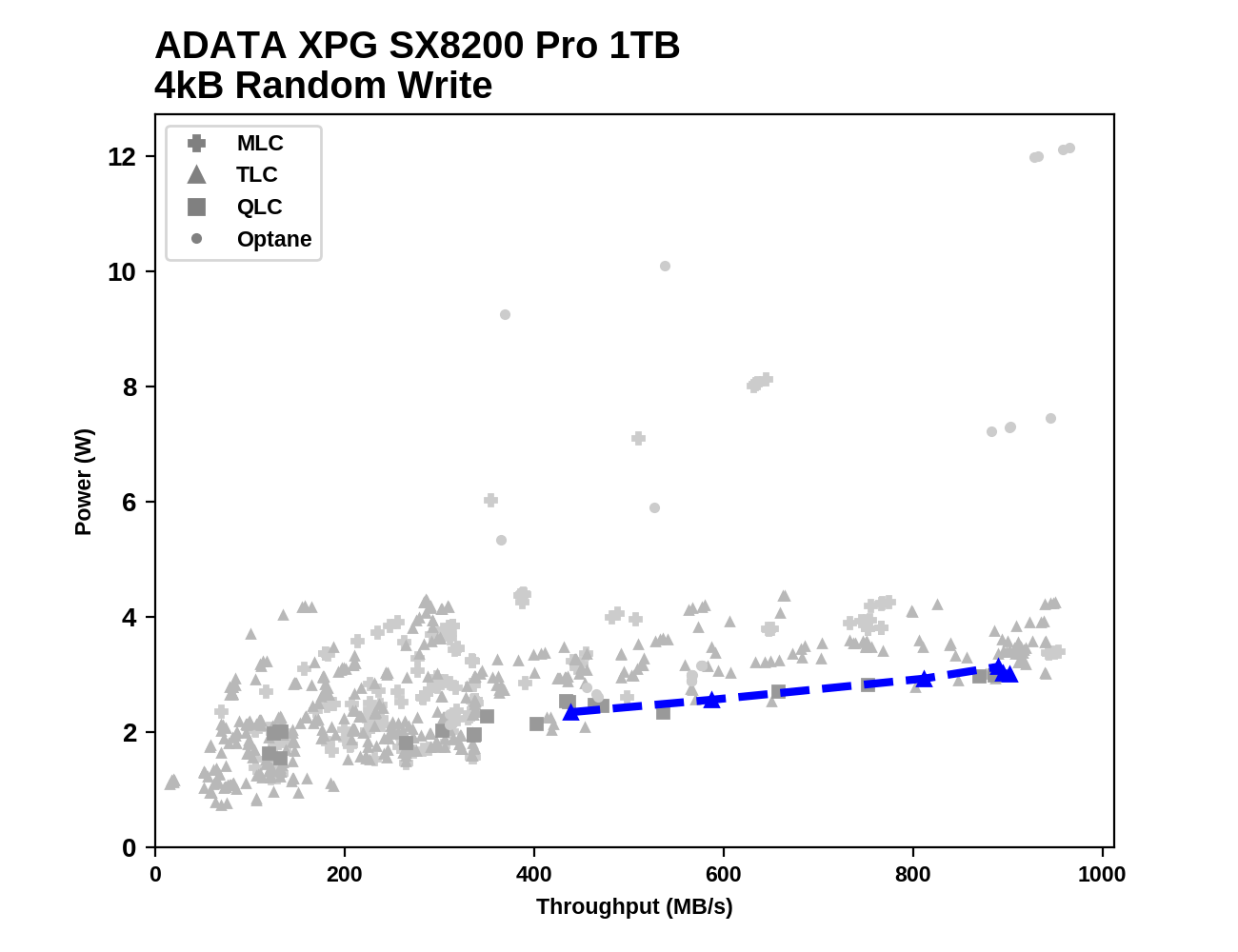








42 Comments
View All Comments
mapesdhs - Thursday, February 7, 2019 - link
I can't help wondering how some of the old favourites would behave in these comparisons, the 950 EVO/Pro, 960s, etc. Have things really moved on that much?Billy Tallis - Thursday, February 7, 2019 - link
We have at least partial test results in Bench for most of the old drives that aren't worth including in every review: https://www.anandtech.com/bench/product/2219?vs=23...eddieobscurant - Thursday, February 7, 2019 - link
It's not about crystal disk mark score. It's about almost no one of the everyday user, playing games, surfing the web and using microsoft office, will come near your "light" test, let alone "heavy" or "torture".Most of them need high random reads for their computer to feel snappy and responsive, and a big enough a slc cache to accommodate a full bluray of writes.
Billy Tallis - Thursday, February 7, 2019 - link
"Most of them need high random reads for their computer to feel snappy and responsive,"They already have that. Further increases to random read performance won't make the system feel any more responsive during light workloads, as demonstrated by SYSmark. High-end NVMe SSDs are already way past the point of diminishing returns for peak random read speeds, especially for lighter workloads where a few GB of DRAM used by the OS for caching is enough to almost completely decouple storage performance from application responsiveness.
eddieobscurant - Friday, February 8, 2019 - link
So, you're saying that optane doesn't feel more responsive to you, or that the high random reads of optane isn't responsible for feeling more responsive than a high end nvme ssd ?Dark_wizzie - Wednesday, February 6, 2019 - link
Why does perf drop on 2tb model?Dark_wizzie - Thursday, February 7, 2019 - link
For low qd random reads, sorry.Dark_wizzie - Thursday, February 7, 2019 - link
And... serves me right for commenting before finishing the last page of the article. >.>oh well.
GreenReaper - Thursday, February 7, 2019 - link
Grabbed an MX500 500GB at Christmas. It's half the price of those tested here, and uses up a spare SATA. Hardly the fastest SSD in the world, but for most purposes it's hard to tell the difference.mapesdhs - Thursday, February 7, 2019 - link
They do seem to be well priced, though I bagged several barely used 850 Pro 512GB units for about the same cost, people seem to be selling them for silly money these days, grud knows why. The 840 Pro is also still very good, one of the most reliable SATA SSDs ever made.